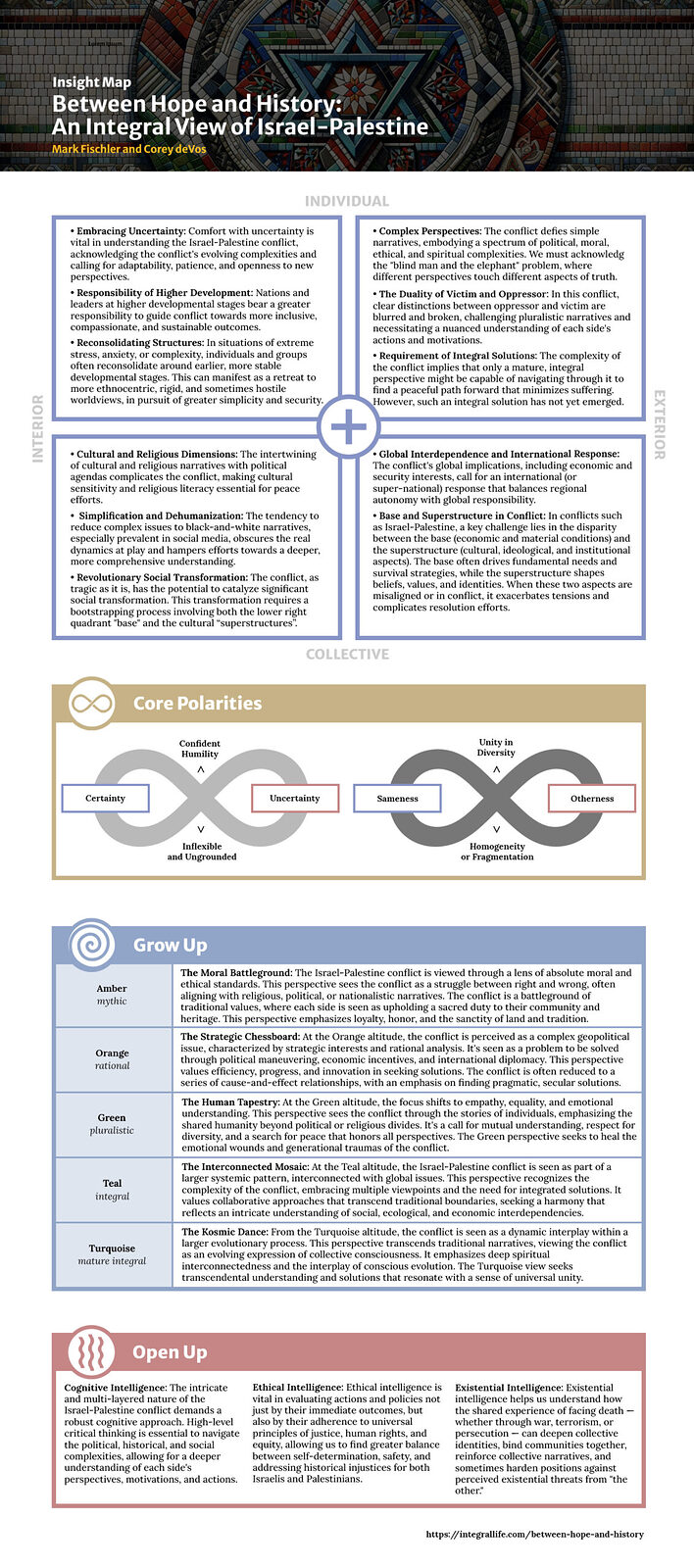Mark Fischler and Corey deVos bring some integral perspective to the Israel-Palestine conflict, navigating the multiple nested contexts that make this issue one of the most enduring and complex in modern history. The conversation explores the critical tensions between different historical legacies, cultural identities, and political intricacies, all contributing to a seemingly intractable conflict that defies simplistic narratives. With deep compassion and empathy, Mark and Corey acknowledge the ongoing violence and suffering experienced by people on both sides, underscoring the urgent need for solutions that address these deep-rooted issues.
The discussion delves into the historical context, recognizing how events dating back over a century continue to shape current realities and perceptions. They explore cultural and religious dimensions, highlighting how deeply ingrained beliefs and identities add layers to the conflict. The role of external global politics is examined, acknowledging how international influences and geopolitical interests complicate the path to peace. Fischler and deVos emphasize the critical need for an integral approach, one that can holistically address the myriad factors at play – from economic disparities to cultural differences to psychological traumas and beyond. This approach, they argue, is likely the only way forward, as it transcends traditional political and diplomatic strategies, aiming to step beyond conflicting narratives and meet the needs of all involved parties.
However, they are also careful to approach this topic with great humility, recognizing that while conflicts as complex as these likely require integral systemic solutions, those solutions have yet to emerge in a concrete form. As such, this conversation is a call for continued dialogue, innovation, and exploration of integral solutions, acknowledging that the path to peace is complex, and the solutions need to be as multifaceted as the conflict itself. Their insights offer a profound understanding of the Israel-Palestine conflict, inviting listeners to contemplate the nuances and seek paths that foster greater understanding, coexistence, and lasting peace.
Key Questions:
Here are some questions you can contemplate while listening to this discussion. We suggest you take some time to use these as journaling prompts.- How do historical narratives influence current perspectives? Reflect on how the history of the region, as discussed in the transcript, shapes the current attitudes and actions of both Israelis and Palestinians.
- What are the roles of cultural and religious identities in the conflict? Consider how cultural and religious identities contribute to the conflict and what this implies for potential resolutions.
- How do economic and material conditions (the 'base') impact the conflict? Analyze how socio-economic factors influence the positions and decisions of the involved parties.
- What are the effects of external global politics on the conflict? Think about how international relations and global politics play into the dynamics of the Israel-Palestine conflict.
- How does the concept of 'othering' exacerbate the conflict? Reflect on the ways in which both sides might 'other' each other and how this impacts the possibility of empathy and understanding.
- How does media portrayal affect public perception of the conflict? Think critically about the role of media in shaping your own and others' views on the conflict.
- What role does individual and collective trauma play? Reflect on how historical and ongoing trauma experienced by both sides influences the conflict and its resolution.
- How can different stages of cognitive and ethical development inform approaches to the conflict? Consider how perspectives from various developmental stages (e.g., Amber, Orange, Green) might offer different solutions.
- What does an integral approach to this conflict look like? Think about how an integral approach, which encompasses multiple perspectives and levels of reality, could offer a more comprehensive solution to the conflict.
